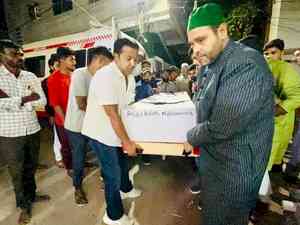seminar on Gender Sensitization
Author(s): City Air NewsProfessor Anupama Roy, Centre for Political Studies, Jawaharlal Nehru University addressing the gathering. Chandigarh, December 24, 2018: Department of Sociology, Panjab University, Chandigarh organized a seminar...


Professor Anupama Roy, Centre for Political Studies, Jawaharlal Nehru University addressing the gathering.
Chandigarh, December 24, 2018: Department of Sociology, Panjab University, Chandigarh organized a seminar on Gender Sensitization, here today. Professor Anupama Roy, Centre for Political Studies, Jawaharlal Nehru University spoke on ‘Gender, Dialogical Spaces and Performance of Citizenship’.
She argued that citizenship is a contested concept, which carries a range of meanings. The study of citizenship cannot, therefore, be limited to its understanding as a political and juridical status within territorially inscribed nation-states, and the entitlements brought by this status. Studies of citizenship have taken what may be called the anthropological turn, speaking of plurality of meaning and practices of citizenship.
Professor Roy argued that gender is central to the institutionalization of citizenship, informing its ideological construction and the structural processes through which it acquires meaning and content. She talked of the hierarchies of citizenship by focusing on the state-formative practices, the citizenship law in India, and people’s performance of citizenship. While doing so, she examined the relationship between state, law and citizenship, focusing in particular on a gendered legal category – the ‘abducted person’ – inscribed in the abducted persons recovery and restoration Act 1949. She then put the bureaucratic exercise of identification of the abducted person in dialogue with Kirti Jain’s play ‘Aur Kitne Tukde’ based on oral narratives of women in partition from Urvashi Butalia’s book the Other side of silence, newspaper accounts, and Jamila Hashmi’s short story, ‘The Exile’. She extended her argument further by a discussion of another moment of performance of citizenship, around the communities of protest produced for legal redress in the so-called Delhi gang-rape – with a quick foray into and with Maya Rao’s performance - ‘The Walk’. She concluded by arguing that political performance is a key technique in the constitution of solidarities, and political publics.

 cityairnews
cityairnews 














